Case Study: Social Cognitive Theory and Royal Bournemouth Hospital
VerifiedAdded on 2022/12/16
|7
|2014
|58
Case Study
AI Summary
This case study examines the application of social cognitive theory to the decision-making processes at Royal Bournemouth and Poole Hospital, focusing on the debate around centralizing emergency services. It explores how personal, behavioral, and environmental factors, as defined by the social cognitive theory, influenced the decision by the Dorset Clinical Commissioning Group (CCG) to designate Royal Bournemouth as the primary emergency hospital and Poole as an elective care center. The analysis considers factors such as patient access, capital costs, staff experiences, and public opinion, including a significant petition to keep Poole's A&E department open. The study highlights the importance of considering all these factors in healthcare decisions, aiming to improve overall patient health and safety while addressing projected funding shortfalls. Ultimately, the case demonstrates how social cognitive theory can provide a framework for understanding and evaluating the complex interplay of factors in healthcare management.
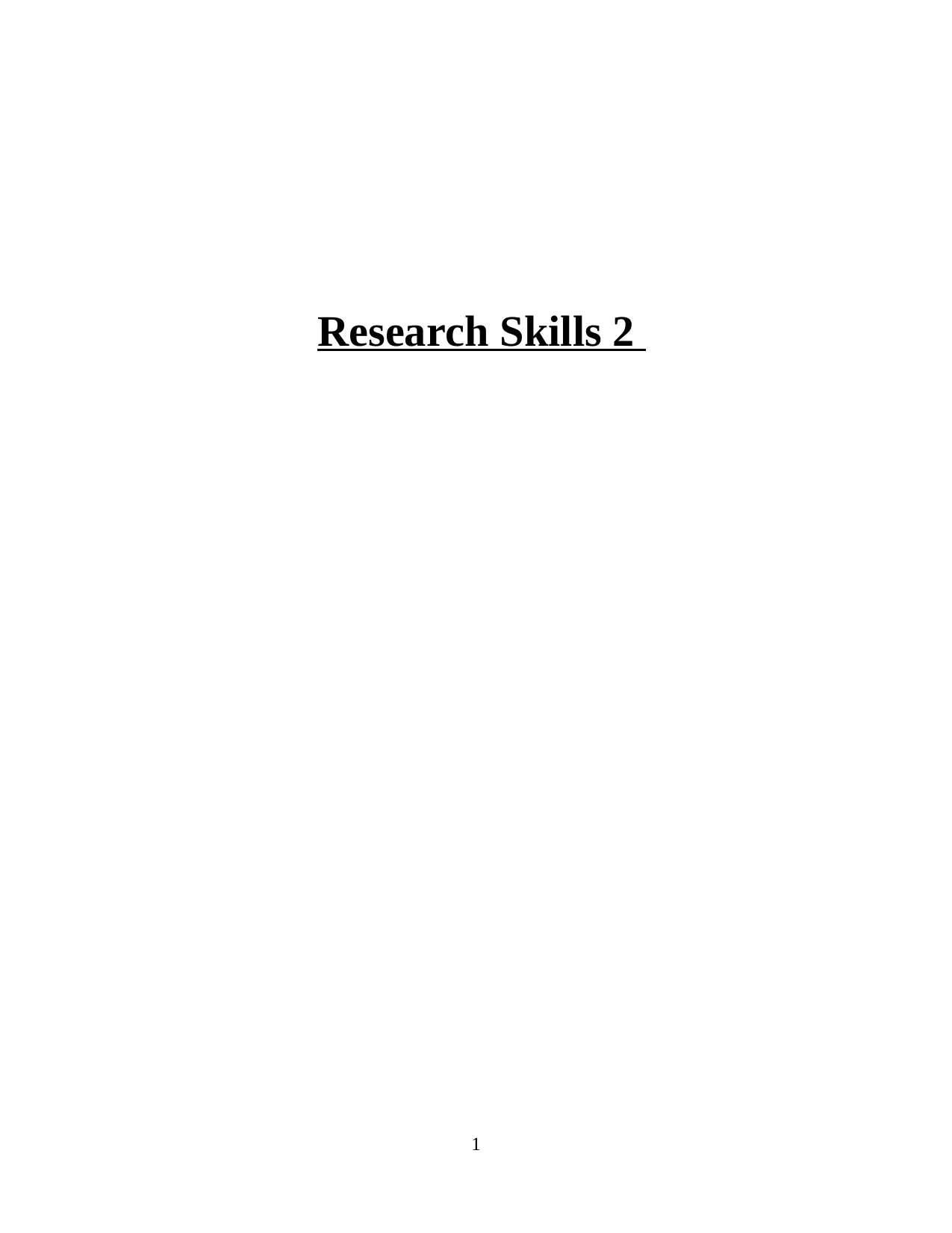
Research Skills 2
1
1
Paraphrase This Document
Need a fresh take? Get an instant paraphrase of this document with our AI Paraphraser
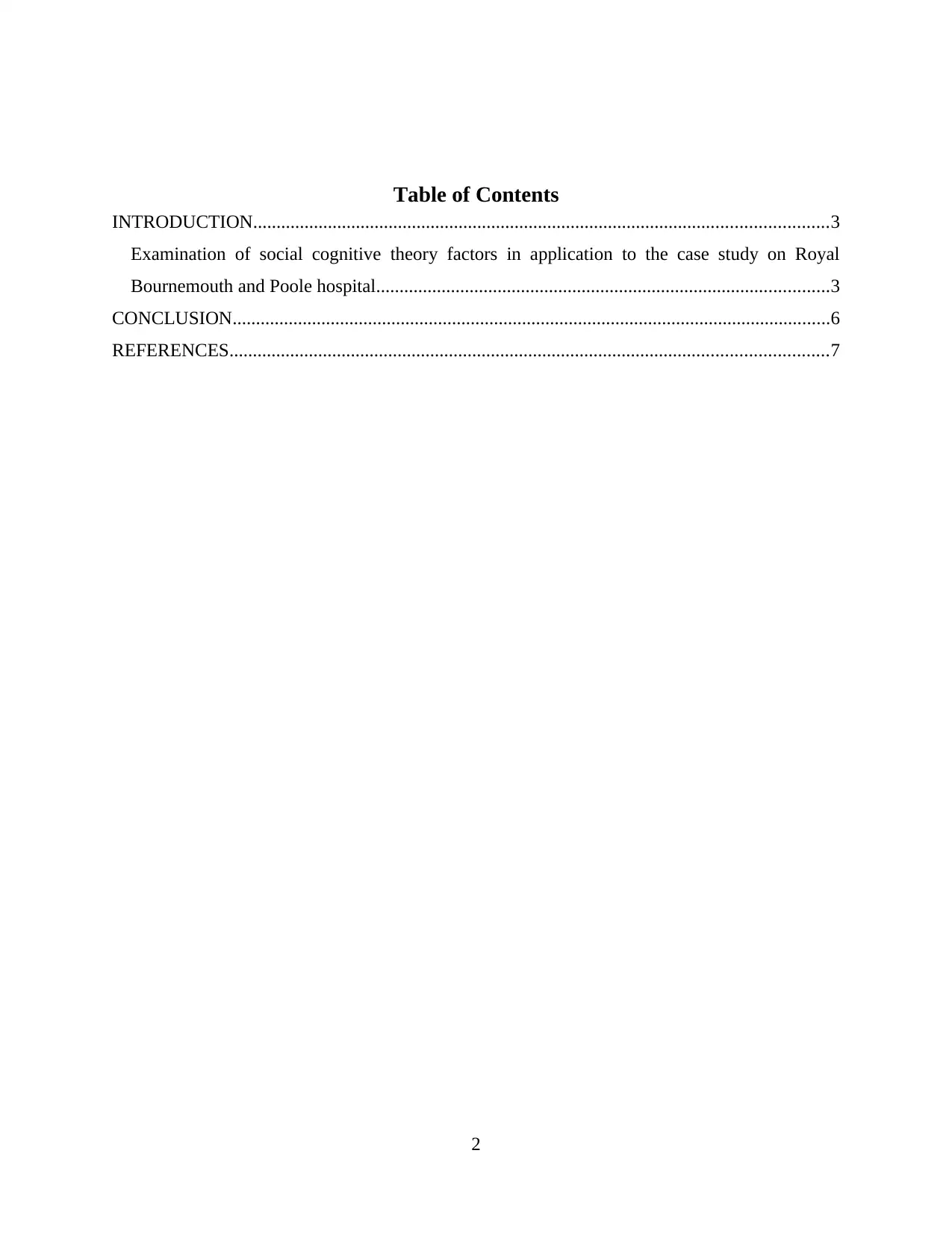
Table of Contents
INTRODUCTION...........................................................................................................................3
Examination of social cognitive theory factors in application to the case study on Royal
Bournemouth and Poole hospital.................................................................................................3
CONCLUSION................................................................................................................................6
REFERENCES................................................................................................................................7
2
INTRODUCTION...........................................................................................................................3
Examination of social cognitive theory factors in application to the case study on Royal
Bournemouth and Poole hospital.................................................................................................3
CONCLUSION................................................................................................................................6
REFERENCES................................................................................................................................7
2
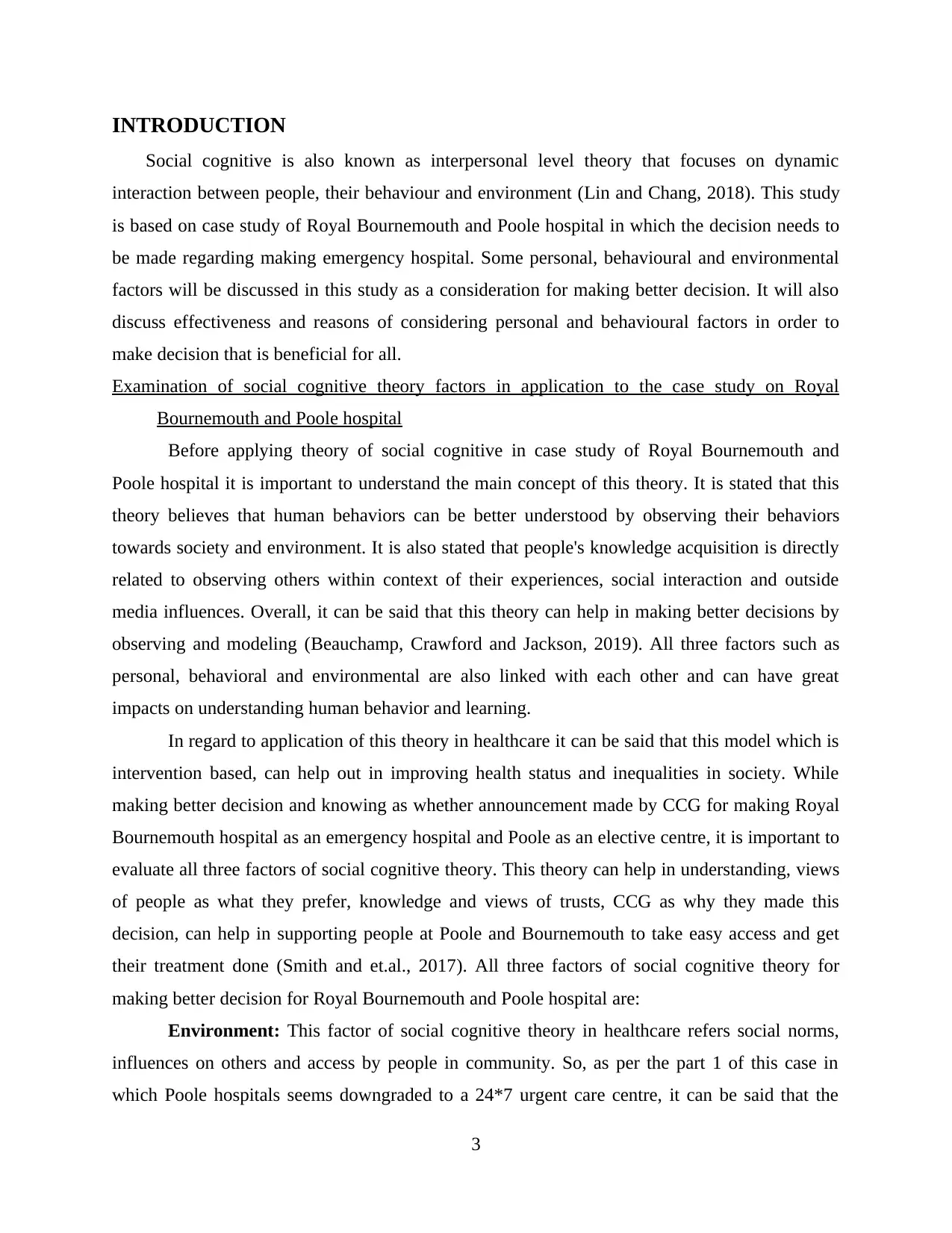
INTRODUCTION
Social cognitive is also known as interpersonal level theory that focuses on dynamic
interaction between people, their behaviour and environment (Lin and Chang, 2018). This study
is based on case study of Royal Bournemouth and Poole hospital in which the decision needs to
be made regarding making emergency hospital. Some personal, behavioural and environmental
factors will be discussed in this study as a consideration for making better decision. It will also
discuss effectiveness and reasons of considering personal and behavioural factors in order to
make decision that is beneficial for all.
Examination of social cognitive theory factors in application to the case study on Royal
Bournemouth and Poole hospital
Before applying theory of social cognitive in case study of Royal Bournemouth and
Poole hospital it is important to understand the main concept of this theory. It is stated that this
theory believes that human behaviors can be better understood by observing their behaviors
towards society and environment. It is also stated that people's knowledge acquisition is directly
related to observing others within context of their experiences, social interaction and outside
media influences. Overall, it can be said that this theory can help in making better decisions by
observing and modeling (Beauchamp, Crawford and Jackson, 2019). All three factors such as
personal, behavioral and environmental are also linked with each other and can have great
impacts on understanding human behavior and learning.
In regard to application of this theory in healthcare it can be said that this model which is
intervention based, can help out in improving health status and inequalities in society. While
making better decision and knowing as whether announcement made by CCG for making Royal
Bournemouth hospital as an emergency hospital and Poole as an elective centre, it is important to
evaluate all three factors of social cognitive theory. This theory can help in understanding, views
of people as what they prefer, knowledge and views of trusts, CCG as why they made this
decision, can help in supporting people at Poole and Bournemouth to take easy access and get
their treatment done (Smith and et.al., 2017). All three factors of social cognitive theory for
making better decision for Royal Bournemouth and Poole hospital are:
Environment: This factor of social cognitive theory in healthcare refers social norms,
influences on others and access by people in community. So, as per the part 1 of this case in
which Poole hospitals seems downgraded to a 24*7 urgent care centre, it can be said that the
3
Social cognitive is also known as interpersonal level theory that focuses on dynamic
interaction between people, their behaviour and environment (Lin and Chang, 2018). This study
is based on case study of Royal Bournemouth and Poole hospital in which the decision needs to
be made regarding making emergency hospital. Some personal, behavioural and environmental
factors will be discussed in this study as a consideration for making better decision. It will also
discuss effectiveness and reasons of considering personal and behavioural factors in order to
make decision that is beneficial for all.
Examination of social cognitive theory factors in application to the case study on Royal
Bournemouth and Poole hospital
Before applying theory of social cognitive in case study of Royal Bournemouth and
Poole hospital it is important to understand the main concept of this theory. It is stated that this
theory believes that human behaviors can be better understood by observing their behaviors
towards society and environment. It is also stated that people's knowledge acquisition is directly
related to observing others within context of their experiences, social interaction and outside
media influences. Overall, it can be said that this theory can help in making better decisions by
observing and modeling (Beauchamp, Crawford and Jackson, 2019). All three factors such as
personal, behavioral and environmental are also linked with each other and can have great
impacts on understanding human behavior and learning.
In regard to application of this theory in healthcare it can be said that this model which is
intervention based, can help out in improving health status and inequalities in society. While
making better decision and knowing as whether announcement made by CCG for making Royal
Bournemouth hospital as an emergency hospital and Poole as an elective centre, it is important to
evaluate all three factors of social cognitive theory. This theory can help in understanding, views
of people as what they prefer, knowledge and views of trusts, CCG as why they made this
decision, can help in supporting people at Poole and Bournemouth to take easy access and get
their treatment done (Smith and et.al., 2017). All three factors of social cognitive theory for
making better decision for Royal Bournemouth and Poole hospital are:
Environment: This factor of social cognitive theory in healthcare refers social norms,
influences on others and access by people in community. So, as per the part 1 of this case in
which Poole hospitals seems downgraded to a 24*7 urgent care centre, it can be said that the
3
⊘ This is a preview!⊘
Do you want full access?
Subscribe today to unlock all pages.

Trusted by 1+ million students worldwide
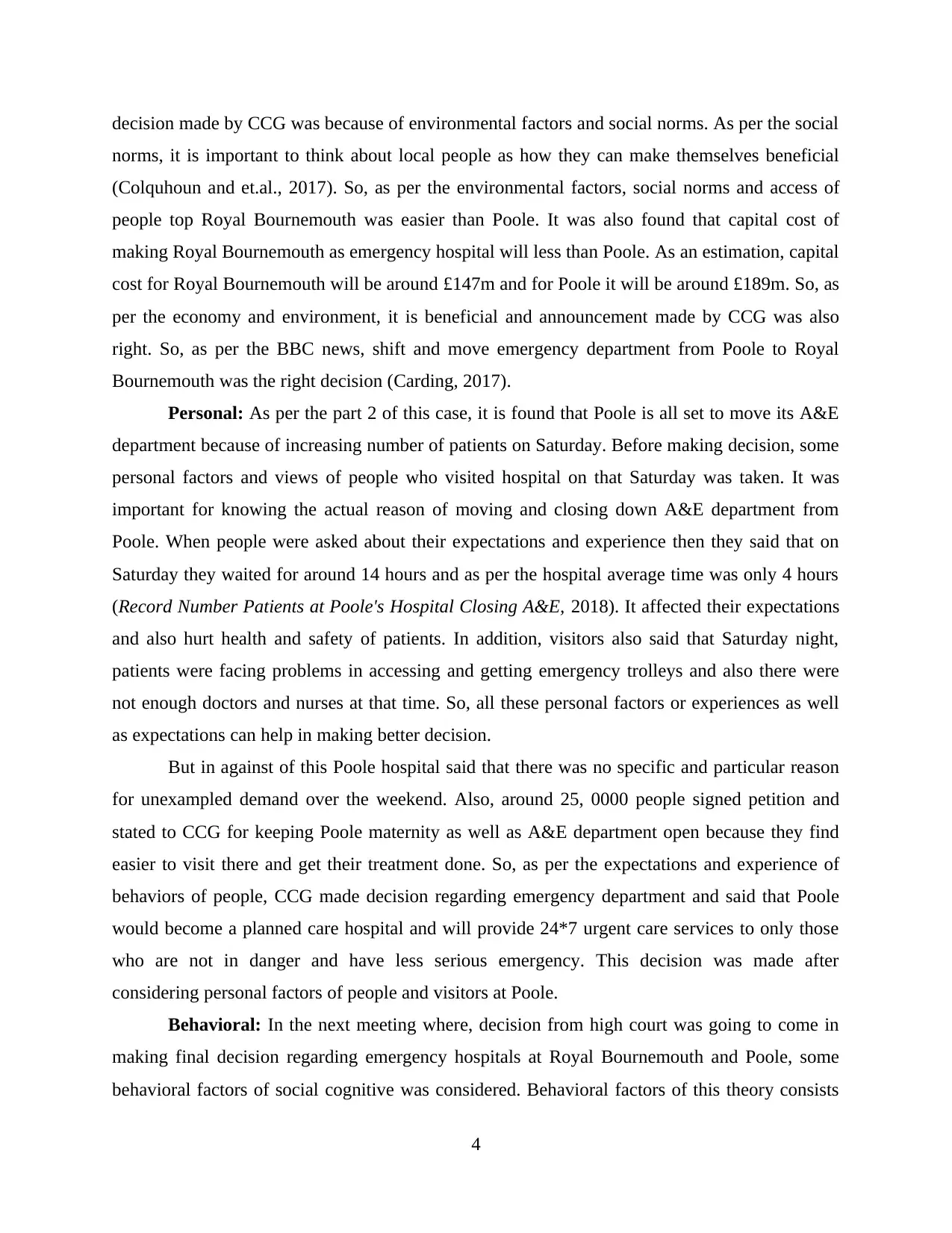
decision made by CCG was because of environmental factors and social norms. As per the social
norms, it is important to think about local people as how they can make themselves beneficial
(Colquhoun and et.al., 2017). So, as per the environmental factors, social norms and access of
people top Royal Bournemouth was easier than Poole. It was also found that capital cost of
making Royal Bournemouth as emergency hospital will less than Poole. As an estimation, capital
cost for Royal Bournemouth will be around £147m and for Poole it will be around £189m. So, as
per the economy and environment, it is beneficial and announcement made by CCG was also
right. So, as per the BBC news, shift and move emergency department from Poole to Royal
Bournemouth was the right decision (Carding, 2017).
Personal: As per the part 2 of this case, it is found that Poole is all set to move its A&E
department because of increasing number of patients on Saturday. Before making decision, some
personal factors and views of people who visited hospital on that Saturday was taken. It was
important for knowing the actual reason of moving and closing down A&E department from
Poole. When people were asked about their expectations and experience then they said that on
Saturday they waited for around 14 hours and as per the hospital average time was only 4 hours
(Record Number Patients at Poole's Hospital Closing A&E, 2018). It affected their expectations
and also hurt health and safety of patients. In addition, visitors also said that Saturday night,
patients were facing problems in accessing and getting emergency trolleys and also there were
not enough doctors and nurses at that time. So, all these personal factors or experiences as well
as expectations can help in making better decision.
But in against of this Poole hospital said that there was no specific and particular reason
for unexampled demand over the weekend. Also, around 25, 0000 people signed petition and
stated to CCG for keeping Poole maternity as well as A&E department open because they find
easier to visit there and get their treatment done. So, as per the expectations and experience of
behaviors of people, CCG made decision regarding emergency department and said that Poole
would become a planned care hospital and will provide 24*7 urgent care services to only those
who are not in danger and have less serious emergency. This decision was made after
considering personal factors of people and visitors at Poole.
Behavioral: In the next meeting where, decision from high court was going to come in
making final decision regarding emergency hospitals at Royal Bournemouth and Poole, some
behavioral factors of social cognitive was considered. Behavioral factors of this theory consists
4
norms, it is important to think about local people as how they can make themselves beneficial
(Colquhoun and et.al., 2017). So, as per the environmental factors, social norms and access of
people top Royal Bournemouth was easier than Poole. It was also found that capital cost of
making Royal Bournemouth as emergency hospital will less than Poole. As an estimation, capital
cost for Royal Bournemouth will be around £147m and for Poole it will be around £189m. So, as
per the economy and environment, it is beneficial and announcement made by CCG was also
right. So, as per the BBC news, shift and move emergency department from Poole to Royal
Bournemouth was the right decision (Carding, 2017).
Personal: As per the part 2 of this case, it is found that Poole is all set to move its A&E
department because of increasing number of patients on Saturday. Before making decision, some
personal factors and views of people who visited hospital on that Saturday was taken. It was
important for knowing the actual reason of moving and closing down A&E department from
Poole. When people were asked about their expectations and experience then they said that on
Saturday they waited for around 14 hours and as per the hospital average time was only 4 hours
(Record Number Patients at Poole's Hospital Closing A&E, 2018). It affected their expectations
and also hurt health and safety of patients. In addition, visitors also said that Saturday night,
patients were facing problems in accessing and getting emergency trolleys and also there were
not enough doctors and nurses at that time. So, all these personal factors or experiences as well
as expectations can help in making better decision.
But in against of this Poole hospital said that there was no specific and particular reason
for unexampled demand over the weekend. Also, around 25, 0000 people signed petition and
stated to CCG for keeping Poole maternity as well as A&E department open because they find
easier to visit there and get their treatment done. So, as per the expectations and experience of
behaviors of people, CCG made decision regarding emergency department and said that Poole
would become a planned care hospital and will provide 24*7 urgent care services to only those
who are not in danger and have less serious emergency. This decision was made after
considering personal factors of people and visitors at Poole.
Behavioral: In the next meeting where, decision from high court was going to come in
making final decision regarding emergency hospitals at Royal Bournemouth and Poole, some
behavioral factors of social cognitive was considered. Behavioral factors of this theory consists
4
Paraphrase This Document
Need a fresh take? Get an instant paraphrase of this document with our AI Paraphraser
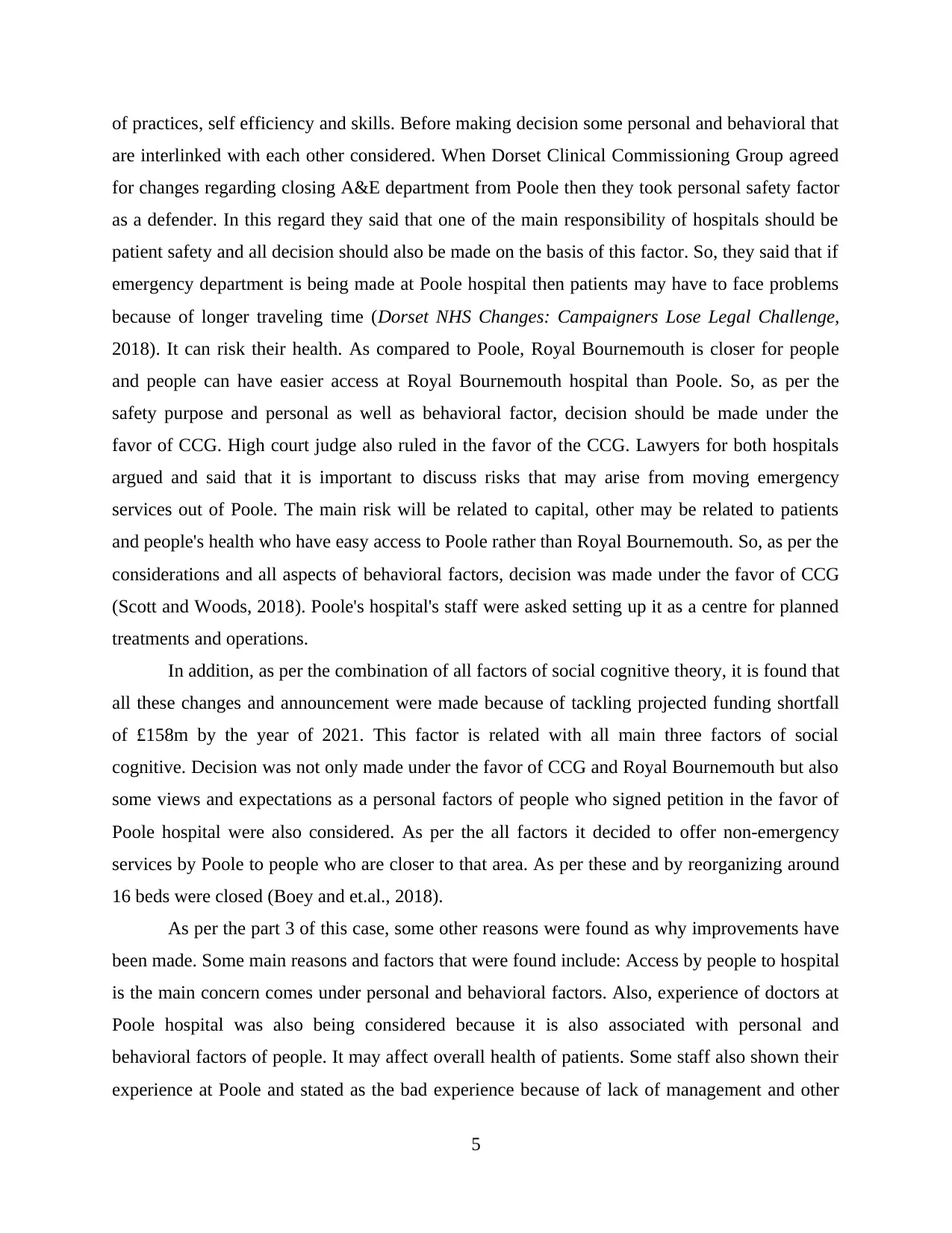
of practices, self efficiency and skills. Before making decision some personal and behavioral that
are interlinked with each other considered. When Dorset Clinical Commissioning Group agreed
for changes regarding closing A&E department from Poole then they took personal safety factor
as a defender. In this regard they said that one of the main responsibility of hospitals should be
patient safety and all decision should also be made on the basis of this factor. So, they said that if
emergency department is being made at Poole hospital then patients may have to face problems
because of longer traveling time (Dorset NHS Changes: Campaigners Lose Legal Challenge,
2018). It can risk their health. As compared to Poole, Royal Bournemouth is closer for people
and people can have easier access at Royal Bournemouth hospital than Poole. So, as per the
safety purpose and personal as well as behavioral factor, decision should be made under the
favor of CCG. High court judge also ruled in the favor of the CCG. Lawyers for both hospitals
argued and said that it is important to discuss risks that may arise from moving emergency
services out of Poole. The main risk will be related to capital, other may be related to patients
and people's health who have easy access to Poole rather than Royal Bournemouth. So, as per the
considerations and all aspects of behavioral factors, decision was made under the favor of CCG
(Scott and Woods, 2018). Poole's hospital's staff were asked setting up it as a centre for planned
treatments and operations.
In addition, as per the combination of all factors of social cognitive theory, it is found that
all these changes and announcement were made because of tackling projected funding shortfall
of £158m by the year of 2021. This factor is related with all main three factors of social
cognitive. Decision was not only made under the favor of CCG and Royal Bournemouth but also
some views and expectations as a personal factors of people who signed petition in the favor of
Poole hospital were also considered. As per the all factors it decided to offer non-emergency
services by Poole to people who are closer to that area. As per these and by reorganizing around
16 beds were closed (Boey and et.al., 2018).
As per the part 3 of this case, some other reasons were found as why improvements have
been made. Some main reasons and factors that were found include: Access by people to hospital
is the main concern comes under personal and behavioral factors. Also, experience of doctors at
Poole hospital was also being considered because it is also associated with personal and
behavioral factors of people. It may affect overall health of patients. Some staff also shown their
experience at Poole and stated as the bad experience because of lack of management and other
5
are interlinked with each other considered. When Dorset Clinical Commissioning Group agreed
for changes regarding closing A&E department from Poole then they took personal safety factor
as a defender. In this regard they said that one of the main responsibility of hospitals should be
patient safety and all decision should also be made on the basis of this factor. So, they said that if
emergency department is being made at Poole hospital then patients may have to face problems
because of longer traveling time (Dorset NHS Changes: Campaigners Lose Legal Challenge,
2018). It can risk their health. As compared to Poole, Royal Bournemouth is closer for people
and people can have easier access at Royal Bournemouth hospital than Poole. So, as per the
safety purpose and personal as well as behavioral factor, decision should be made under the
favor of CCG. High court judge also ruled in the favor of the CCG. Lawyers for both hospitals
argued and said that it is important to discuss risks that may arise from moving emergency
services out of Poole. The main risk will be related to capital, other may be related to patients
and people's health who have easy access to Poole rather than Royal Bournemouth. So, as per the
considerations and all aspects of behavioral factors, decision was made under the favor of CCG
(Scott and Woods, 2018). Poole's hospital's staff were asked setting up it as a centre for planned
treatments and operations.
In addition, as per the combination of all factors of social cognitive theory, it is found that
all these changes and announcement were made because of tackling projected funding shortfall
of £158m by the year of 2021. This factor is related with all main three factors of social
cognitive. Decision was not only made under the favor of CCG and Royal Bournemouth but also
some views and expectations as a personal factors of people who signed petition in the favor of
Poole hospital were also considered. As per the all factors it decided to offer non-emergency
services by Poole to people who are closer to that area. As per these and by reorganizing around
16 beds were closed (Boey and et.al., 2018).
As per the part 3 of this case, some other reasons were found as why improvements have
been made. Some main reasons and factors that were found include: Access by people to hospital
is the main concern comes under personal and behavioral factors. Also, experience of doctors at
Poole hospital was also being considered because it is also associated with personal and
behavioral factors of people. It may affect overall health of patients. Some staff also shown their
experience at Poole and stated as the bad experience because of lack of management and other
5
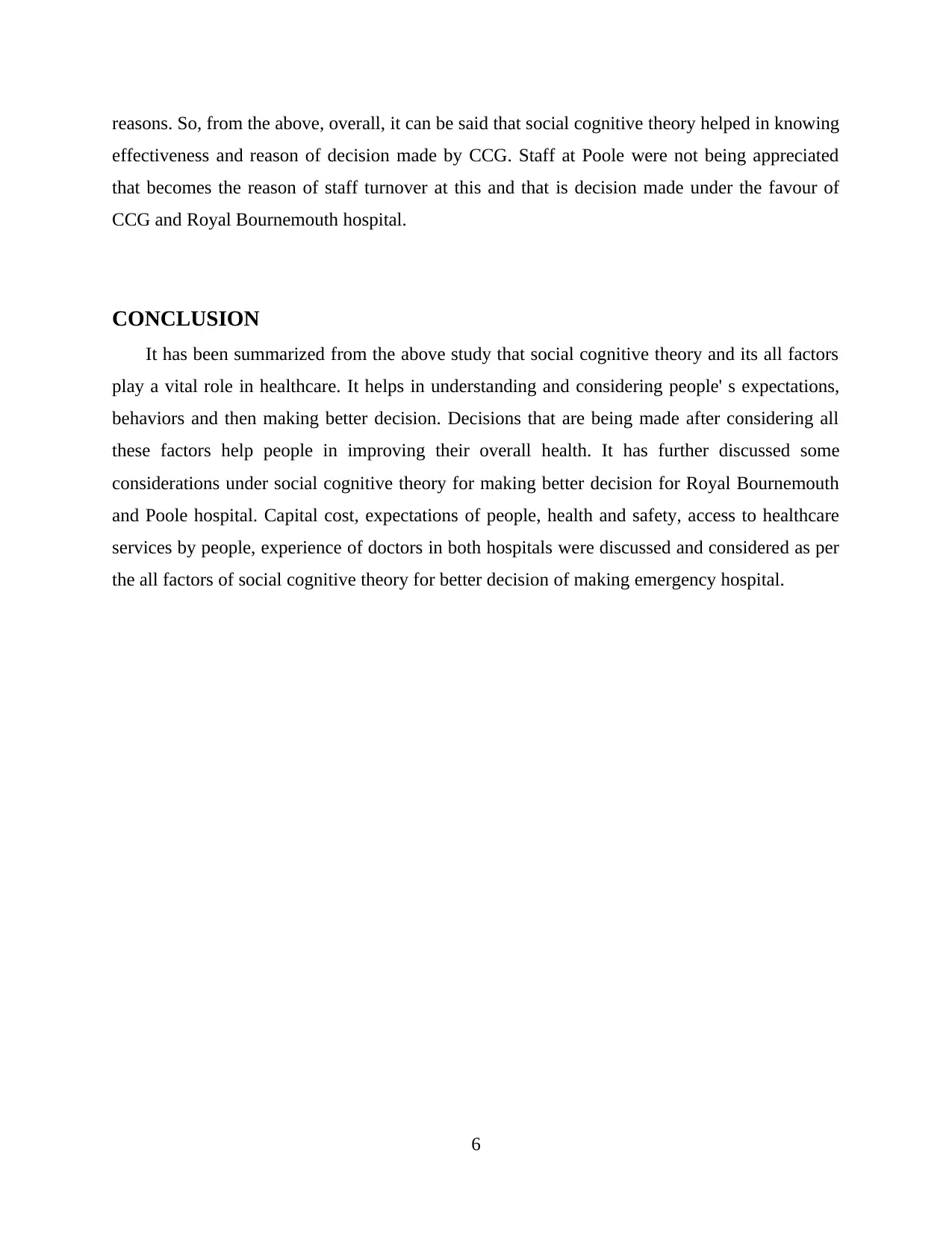
reasons. So, from the above, overall, it can be said that social cognitive theory helped in knowing
effectiveness and reason of decision made by CCG. Staff at Poole were not being appreciated
that becomes the reason of staff turnover at this and that is decision made under the favour of
CCG and Royal Bournemouth hospital.
CONCLUSION
It has been summarized from the above study that social cognitive theory and its all factors
play a vital role in healthcare. It helps in understanding and considering people' s expectations,
behaviors and then making better decision. Decisions that are being made after considering all
these factors help people in improving their overall health. It has further discussed some
considerations under social cognitive theory for making better decision for Royal Bournemouth
and Poole hospital. Capital cost, expectations of people, health and safety, access to healthcare
services by people, experience of doctors in both hospitals were discussed and considered as per
the all factors of social cognitive theory for better decision of making emergency hospital.
6
effectiveness and reason of decision made by CCG. Staff at Poole were not being appreciated
that becomes the reason of staff turnover at this and that is decision made under the favour of
CCG and Royal Bournemouth hospital.
CONCLUSION
It has been summarized from the above study that social cognitive theory and its all factors
play a vital role in healthcare. It helps in understanding and considering people' s expectations,
behaviors and then making better decision. Decisions that are being made after considering all
these factors help people in improving their overall health. It has further discussed some
considerations under social cognitive theory for making better decision for Royal Bournemouth
and Poole hospital. Capital cost, expectations of people, health and safety, access to healthcare
services by people, experience of doctors in both hospitals were discussed and considered as per
the all factors of social cognitive theory for better decision of making emergency hospital.
6
⊘ This is a preview!⊘
Do you want full access?
Subscribe today to unlock all pages.

Trusted by 1+ million students worldwide
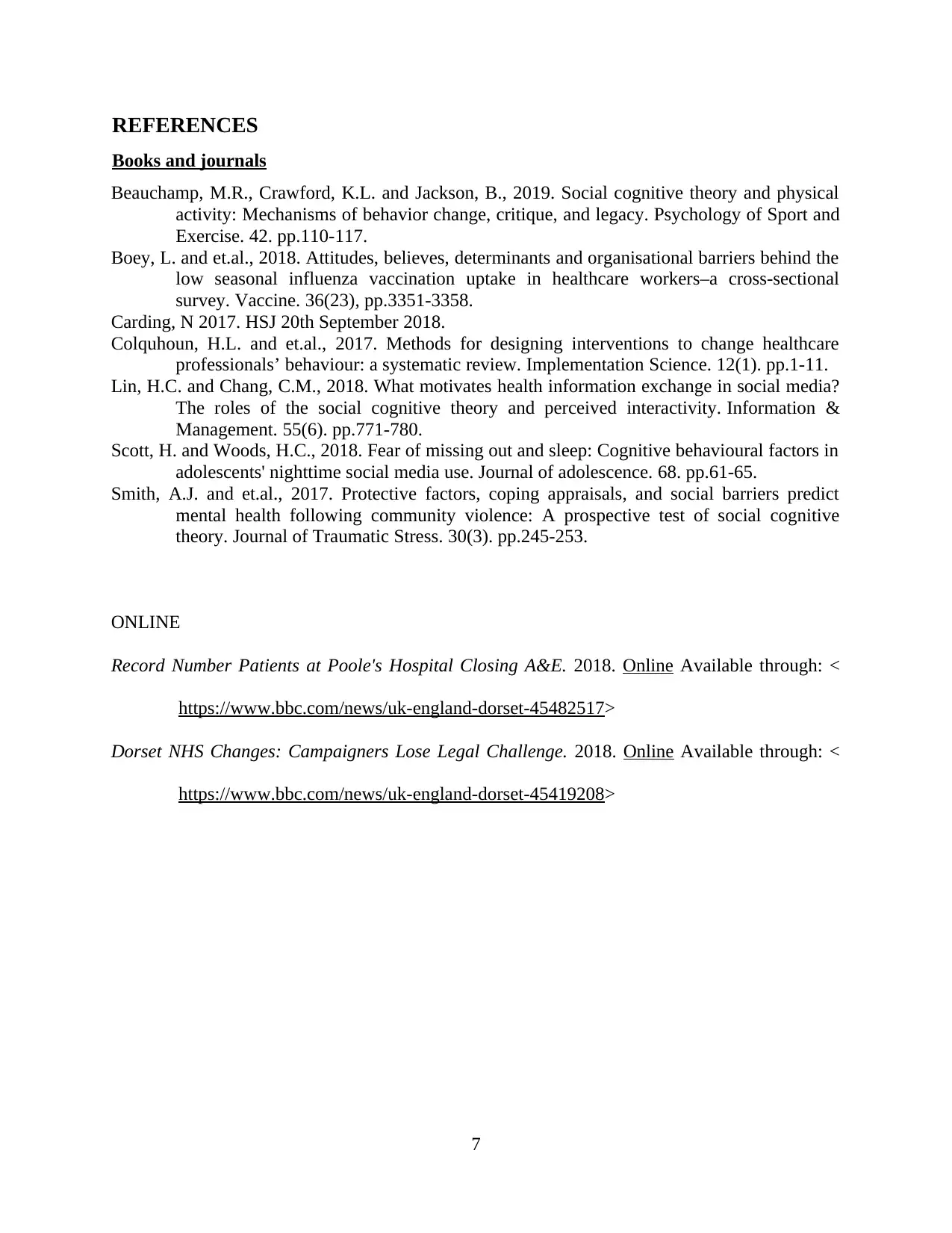
REFERENCES
Books and journals
Beauchamp, M.R., Crawford, K.L. and Jackson, B., 2019. Social cognitive theory and physical
activity: Mechanisms of behavior change, critique, and legacy. Psychology of Sport and
Exercise. 42. pp.110-117.
Boey, L. and et.al., 2018. Attitudes, believes, determinants and organisational barriers behind the
low seasonal influenza vaccination uptake in healthcare workers–a cross-sectional
survey. Vaccine. 36(23), pp.3351-3358.
Carding, N 2017. HSJ 20th September 2018.
Colquhoun, H.L. and et.al., 2017. Methods for designing interventions to change healthcare
professionals’ behaviour: a systematic review. Implementation Science. 12(1). pp.1-11.
Lin, H.C. and Chang, C.M., 2018. What motivates health information exchange in social media?
The roles of the social cognitive theory and perceived interactivity. Information &
Management. 55(6). pp.771-780.
Scott, H. and Woods, H.C., 2018. Fear of missing out and sleep: Cognitive behavioural factors in
adolescents' nighttime social media use. Journal of adolescence. 68. pp.61-65.
Smith, A.J. and et.al., 2017. Protective factors, coping appraisals, and social barriers predict
mental health following community violence: A prospective test of social cognitive
theory. Journal of Traumatic Stress. 30(3). pp.245-253.
ONLINE
Record Number Patients at Poole's Hospital Closing A&E. 2018. Online Available through: <
https://www.bbc.com/news/uk-england-dorset-45482517>
Dorset NHS Changes: Campaigners Lose Legal Challenge. 2018. Online Available through: <
https://www.bbc.com/news/uk-england-dorset-45419208>
7
Books and journals
Beauchamp, M.R., Crawford, K.L. and Jackson, B., 2019. Social cognitive theory and physical
activity: Mechanisms of behavior change, critique, and legacy. Psychology of Sport and
Exercise. 42. pp.110-117.
Boey, L. and et.al., 2018. Attitudes, believes, determinants and organisational barriers behind the
low seasonal influenza vaccination uptake in healthcare workers–a cross-sectional
survey. Vaccine. 36(23), pp.3351-3358.
Carding, N 2017. HSJ 20th September 2018.
Colquhoun, H.L. and et.al., 2017. Methods for designing interventions to change healthcare
professionals’ behaviour: a systematic review. Implementation Science. 12(1). pp.1-11.
Lin, H.C. and Chang, C.M., 2018. What motivates health information exchange in social media?
The roles of the social cognitive theory and perceived interactivity. Information &
Management. 55(6). pp.771-780.
Scott, H. and Woods, H.C., 2018. Fear of missing out and sleep: Cognitive behavioural factors in
adolescents' nighttime social media use. Journal of adolescence. 68. pp.61-65.
Smith, A.J. and et.al., 2017. Protective factors, coping appraisals, and social barriers predict
mental health following community violence: A prospective test of social cognitive
theory. Journal of Traumatic Stress. 30(3). pp.245-253.
ONLINE
Record Number Patients at Poole's Hospital Closing A&E. 2018. Online Available through: <
https://www.bbc.com/news/uk-england-dorset-45482517>
Dorset NHS Changes: Campaigners Lose Legal Challenge. 2018. Online Available through: <
https://www.bbc.com/news/uk-england-dorset-45419208>
7
1 out of 7
Related Documents
Your All-in-One AI-Powered Toolkit for Academic Success.
+13062052269
info@desklib.com
Available 24*7 on WhatsApp / Email
![[object Object]](/_next/static/media/star-bottom.7253800d.svg)
Unlock your academic potential
Copyright © 2020–2025 A2Z Services. All Rights Reserved. Developed and managed by ZUCOL.





